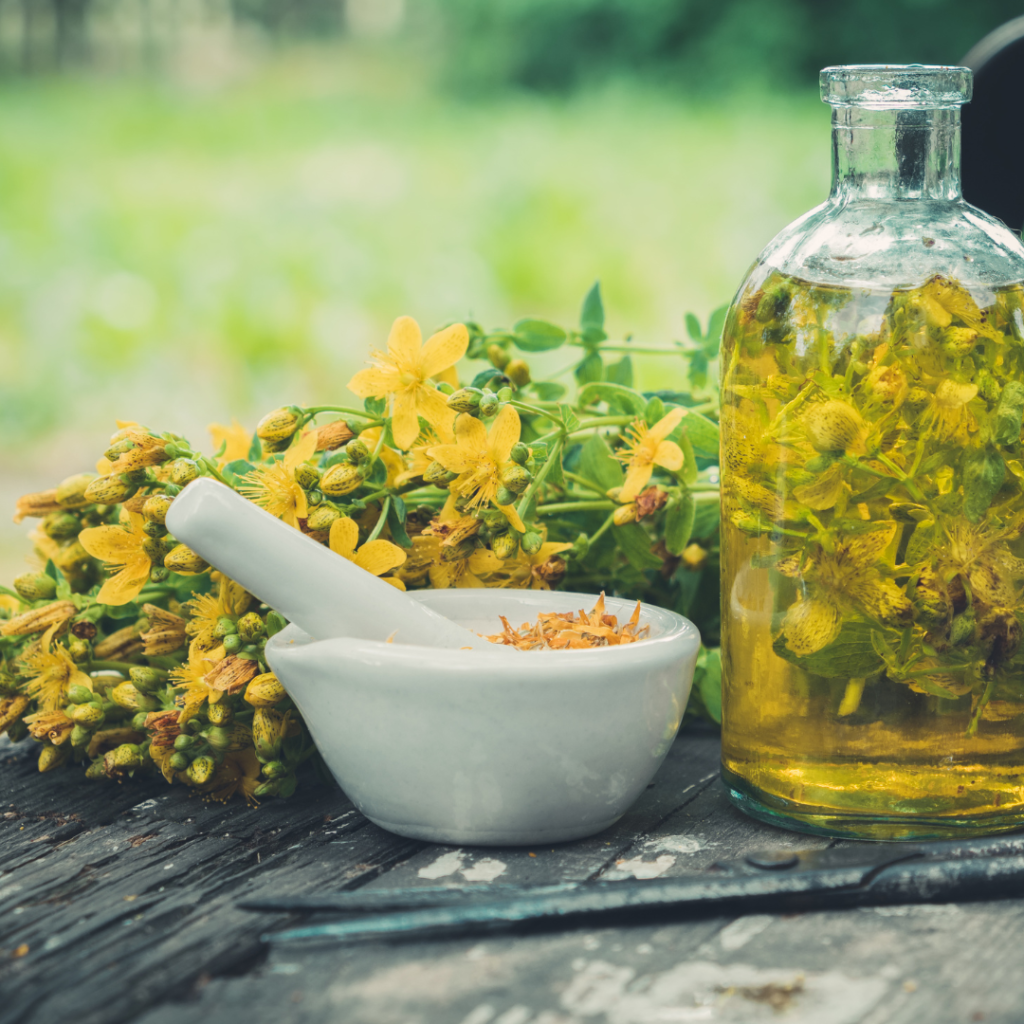I’m sure many of you have heard St. John’s Wort in relation to depression. But what if I told you that is really a side effect of its real medicinal values?

That’s right – it really isn’t an anti-depressant. It is not going to cure depression. That is not where its medicinal properties shine. People have pigeonholed it into this wonderful anti-depressant, but I wouldn’t take it for depression. There are much better herbs for depression, but that is another blog.
But taking away that one aspect of this herb leaves so many other medicinal aspects open.
Let’s start with the reason many doctors and pharmaceutical companies don’t like St. John’s Wort.
St. John’s Wort is one of the best liver detoxification herbs in existence. But what does this have to do with prescriptions and doctors?
Because it detoxifies and cleanses the liver, this herb makes the liver work too efficiently for prescriptions. It will actually move the medication through the body too quickly thereby negating the prescriptions effectiveness. So, when taking certain prescription medications, this effectiveness is not necessarily a good thing. Therefore, before ingesting St. John’s Wort always work with a Clinical or Master Herbalist to ensure any medications are not going to be affected.
The upside is that taking it makes your liver work better with the assimilation of nutrients and elimination of toxins, which effects mood and thereby is associated with reducing depression. There is one of the depression relationships.
Can we kind of see this conundrum here? The liver works too well and doesn’t let the anti-depressants do their thing before being eliminated and since St. John’s Wort isn’t really an anti-depressant, the depression isn’t going to go away in the say way or as fast as taking anti-depressants. Like I said, it isn’t really a herb for depression.
The great thing is that our skin (our largest organ that breaths) can take in topical versions of St. John’s Wort without the contraindications of taking it internally if you are on medications. From my education, if you aren’t on medications, then St. John’s Wort is perfectly safe to use internally as well. But as I stated before, check with a professional, Clinical or Master Herbalist, to help you determine if this is a safe option for you.
Moving on, I have found through using St. John’s Wort as an infused oil in my alternative wellness practice, my clients reap many of the benefits that are associated with it.
The reasons I use St. John’s Wort with clients usually falls in one of the following 9 categories.
Mood Disorders and Mental Health
Anti-inflammatory
Anti-Spasmodic
Wound Healing
Pain Relief and Nerve Health
Skin Health
Anti-Bacterial and Anti-Viral
Hormonal and Menopause Support
Cognitive Function and Brain Health

Many of these categories overlap, and if you didn’t notice, there is a lot more here than “fights depression.”
For instance, St. John’s Wort as an anti-inflammatory can be used topically to help with the inflammation associated with insect bites, sprains, strains. It also can help with rashes, eczema, acne and sunburns.
But wait a minute, some of those issues have pain associated with them too. Of course they do, and since St. John’s Wort has analgesic properties, it helps relieve pain associated with inflammation.
But pain is from nerves being triggered. Yes, it is and that is why St. John’s Wort can also help alleviate pain due to nerve damage. In fact, St. John’s Wort can help nerves in lots of ways. For example, a person that has neuropathy in hands and/or feet can start to reverse the effects of the neuropathy with consistent used of St. John’s Wort Infused Oil. This works on restoring feeling in all types of neuropathies and reduces inflammation and pain in other nerve issues. Personally, through working with my clients, I have seen it work on relieving sciatica, motor neuropathy, peripheral neuropathy (diabetic neuropathy). Then for myself, it helps with my sciatic, pinched nerves, arthritis, and my chronic back pain and issues; it keeps me able to work with my massage and alternative healing clients in the wellness center.
The other cool thing about St. John’s Wort is that it can help speed the healing of wounds and bruises, reduce pain of carpal tunnel and ear infections.
This is all before we even consider the side effect it has of helping with depression.
St. John’s Wort may even play a role in helping with reducing the symptoms of menopause. I’ve seen the data but haven’t tried it yet myself or with clients. It is in the works and I’m hoping it can be added to the arsenal of menopause herbs I currently have (but this topic too is another blog).
So, let’s look at the brain health and mental health. Preliminary studies have shown that St. John’s Wort can regenerate nerves and thereby promote cognitive functions in the brain and is currently being studied for its potential in reducing the risk of cognitive diseases, such as dementia and Alzheimer’s. I’m watching the research and will continue to monitor it because this is big news. How would I use St. John’s Wort topically for this? I don’t think a person could use it topically but definitely could be used internally as a tea or capsules. This is how St. John’s Wort would be used for brain and mental health.
Truth be told, St. John’s Wort is pretty spectacular even without the depression fighting. But if we look at the data, many believe that St. John’s Wort works a lot like SSRIs (selective serotonin reuptake inhibitors); this means, it actually helps improve mood, reduce anxiety and can be consider a mood stabilizer of sorts. There are still more studies being run, but even if this turns out not to be the case, St. John’s Wort, as I just said, is pretty spectacular.
I personally don’t take it internally. I use it externally only and all the clients I work with use it externally as well, and it is giving some of them life-changing effects of their use of it.
The takeaway today is that St. John’s Wort is one of my go to infused oils and topical remedies. The list of its benefits is long, and it is proven to work in all the areas I’ve listed. However, before taking it internally, please work with a Clinical or Master Herbalist to ensure that you are not taking a prescribed medication that could be contraindicated for St. John’s Wort. Herbs are safe for the most part when we aren’t taking prescription medications, and some are safe even then. Don’t just take it because of a trend. Talk to a herbal professional (Clinical Herbalist, Master Herbalist, or Nutritional Herbalist).
If you can’t take it internally, topically works in many of the uses better than internally. The Healing Storm Apothecary always has St. John’s Wort Infused Oil on hand. When used topically, you can’t use too much ever. It is made with organic St. John’s Wort, and organic Avocado and Olive Oils. We do use a tiny bit of alcohol when infusing dried herbs, but that burns off in the infusion process. I would say I love it because I do, but my clients love it too.
Hope this information has helped you just a little to learn about St. John’s Wort and the need to work with a professional herbalist when considering using this spectacular herb.

DISCLAIMER: This blog was written by Chanin Storm and is not AI generated. We want to ensure that what is in the blogs matches our mission and vision of The Healing Storm Holistic Wellness, LLC which means that we want to be transparent in the information that we provide. We want to be authentic in what we say and do. This is just one way that we feel we can keep our authenticity with our clients and followers.
This blog is for educational purposes only.